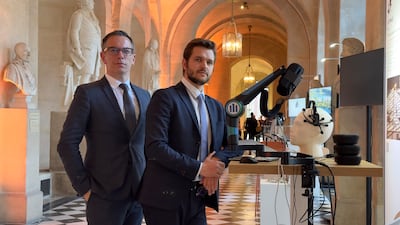A newly announced coalition is seeking to create the largest dataset of brain signals with the aim of making the most of artificial intelligence and brain-computer interfaces to help people with disabilities.
At the AI for Good Summit in Switzerland, the Brainwaves for Inclusion (BR4IN) initiative was launched to address the problem of limited datasets available to medical and technology experts to train brain-computer interfaces.
“The world has already witnessed the effectiveness of non-invasive, AI-powered neural interfaces, but without large, open, inclusive brainwave datasets, that promise remains locked in the lab and is accessible only to a handful of users,” said Olivier Oullier, chief executive of Inclusive Brains, which spearheaded the development of BR4IN.
Inclusive Brains, along with Allianz Trade, developed the Prometheus brain-computer interface (BCI) device to assist people “living with severe cognitive and physical impairments”.
Prometheus BCI was used during the Olympic Games in Paris to help someone with a motor disability carry the Olympic torch.

A user also used it to compose a tweet to French President Emmanuel Macron, without touching a keyboard or speaking a word.
Similar BCI systems could also allow people to drive cars simply by using their minds.
Yet many iterations of BCI depend on the ability of developers to use brain signal data that is not easy to come by.
“Donate brainwaves, change lives,” reads the slogan under the BR4IN logo on the coalition's initial announcement.
It is hoped that, with the creation of the BR4IN initiative, significantly more attention will be drawn to the issue and more brainwave data will be made available.

“Our goal is to provide engineers, researchers, and innovators worldwide with enough high-quality brain data to accelerate and scale the development of Brain-Computer Interfaces that could allow millions of people with motor and speech impairments to 'mind-control' their phones, computers, vehicles, or smart homes,” said Mr Oullier, who is also a visiting professor at the UAE's Mohamed bin Zayed University of Artificial Intelligence.
“AI-supported autonomy could ultimately enhance their access to education and employment opportunities.”
Although it is unclear how the BR4IN initiative will increase the availability of brain-signal data, a news release from Inclusive Brains said that “data will remain securely under the control of each donor, who will be able to decide whether they want to opt out of contributing their data to specific BCI-related social impact research projects”.
BR4IN also said it plans to ensure that all brainwave data is anonymised before being used by researchers.
“It will include a secure infrastructure built on a privacy-by-design framework,” read the news release.
Other contributing entities partnering with BR4IN include The Neurorights Foundation and Assistive Tech for Inclusion Impact Initiative.


